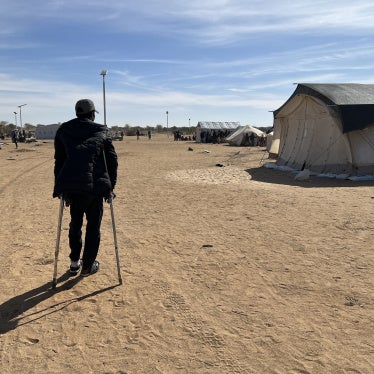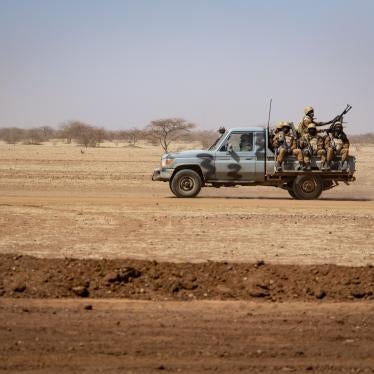Sudanese rebels should go back to the negotiating table with international aid agencies to avoid massive civilian suffering.
Hundreds of thousands of civilians in southern Sudan face the cutoff of essential services, including food, because the rebel Sudan People's Liberation Movement/Army (SPLM/A) refused to extend the deadline for negotiations with nongovernmental organizations (NGOs). The rebels set March 1, 2000 as the deadline for negotiating the Memorandum of Understanding and threatened the safety of relief agencies who did not evacuate by that date. As a result some eleven agencies handling about 75 percent of the humanitarian aid evacuated their staff and equipment on or before the deadline.
Human Rights Watch also criticized a rebel demand raised during negotiations that the aid agencies make their assets, such as vehicles and other equipment, available to the SPLA for its use. Such a provision would blur the line between civilian relief work and military activity and make aid agencies vulnerable to government attack, Human Rights Watch said.
"The SPLA is behaving irresponsibly," said Jemera Rone, Sudan researcher for Human Rights Watch. "It has imposed an artificial and unnecessary deadline that puts many, many civilian lives at risk."
Rone noted that a personal telephone call from U.S. Secretary of State Madeleine Albright to SPLA Commander-in-Chief John Garang had evidently failed to persuade the SPLA to drop its artificial cutoff date.
Human Rights Watch said that if the SPLA wanted to expel agencies that provide essential services to the civilian population, it should have arranged a transition period so that other agencies could be brought in to cover civilian needs.
Rone noted that none of the donor governments, nor even the United Nations, intervened early enough nor forcefully enough to prevent the impasse. The SPLA rejected a European Union proposal put forward in January 2000. The United States government waited until mid-February to deploy its senior envoy to mediate with the SPLA and the agencies, and issued a statement "deploring" the imminent expulsion only on February 28.
"The SPLA claims to be the de facto government of the south, but it has not demonstrated any concern for the impact its deadline would have on the civilians in its jurisdiction," said Rone.
The negotiations over the Memorandum of Understanding the SPLA wanted the agencies to sign went on for more than one year. Although twenty-eight relief agencies signed before the deadline, some of them have said they did so under duress. The eleven who refused to sign are among the biggest relief and health care providers in southern Sudan, and have been there for more than a decade, including CARE International, World Vision, Save the Children-UK, Radda Barnen (Save the Children-Sweden), German Agro Action, Oxfam-UK, Medecins Sans Frontieres-Holland, Global 2000, and others.
Rone raised the example of the Nuer people, who fled in all directions from the government's military onslaught because it wants access to the oil beneath their homeland. The aid agency World Vision has been supplying displaced Nuer people with aid in the (SPLA-controlled) Bahr El Ghazal region of southern Sudan. "These Nuer cannot possibly return to their homes—it is too dangerous," said Rone. "They have lost all their cattle, their food and seeds, their clothes, and their cooking implements when the government displaced them. What are they supposed to do without international aid?"
Human Rights Watch cautioned that it would not be easy for any new agencies to overcome the formidable logistical obstacles to operating in southern Sudan. During the famine in 1998, the effort to bring in sufficient aid took months.
"To reinvent the supply networks is not something that can be done overnight," said Rone. She also noted the danger that funds will be rerouted by donors to other emergencies.
Relief agencies withdrawing from southern Sudan have taken their vehicles and equipment with them, at the cost of millions of dollars. The SPLA cooperated for the most part with their orderly evacuation.
Rone noted that the Sudan government has frequently bombed hospitals and relief airstrips in southern Sudan, in violation of international law. She cautioned that the assets of relief agencies could become legitimate military targets if the SPLA were to take control of them.
"The bright line between civilian and military activities has got to be maintained," Rone said. "Any agreement the SPLA eventually signs with aid agencies must make it clear that their assets are off limits to the SPLA for any purpose."
Human Rights Watch condemned the Sudan government for bombing another civilian hospital in rebel territory a few days ago, killing two and injuring about a dozen civilians. Eleven of twelve bombs fell at the hospital, according to the NGO in charge, Samaritan's Purse, a U.S. aid organization. The hospital was in Lui, Equatoria, an area not currently on the front line.
Human Rights Watch noted that the SPLA expulsion of some agencies was compounded by the European Union decision to stop all aid to the southern sector of the United Nations umbrella relief group, Operation Lifeline Sudan (OLS). The European Union accounts for some 40 percent of the funding going to the OLS (southern sector). Some of this funding goes to rebel areas not controlled by the SPLA, such as the Nuer areas, which have been under attack by the government, causing massive displacement in all directions. Many displaced Nuer fled to other Nuer areas not controlled by the SPLA.
"Why are these displaced Nuer being penalized by the E.U.? They are not in SPLA territory and have not been for almost a decade. They have lost everything when they were forced from their land. Why won't the E. U. continue to help them? It too is drawing arbitrary lines to the disadvantage of needy southerners," Rone said.
Human Rights Watch urged the United States, the European Union, and other donors as well as the United Nations to take a more active role in the negotiations.








